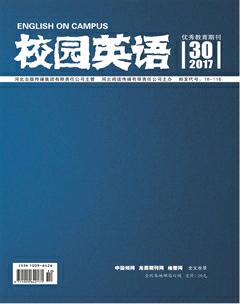The Effect of Globalization on the Production and Development of Contemporary Education Policymaking
匡燕珍
【Abstract】Globalization has a great impact on the contemporary education, especially on education policymaking. In this paper, the impact will be illustrated in two aspects: policy borrowing and lending, and the rise of new education policy.
【Key words】Globalization Education policymaking
Globalization has a great effect on education policy, since education should be adapted to the demand of globalization and the development of society and education should be “maintaining competitiveness, increasing numbers of jobs, raising standards and improving quality” (Donn & Al-Manthri, 2010, p.7). In this paper, two aspects of impact will be introduced: policy borrowing and lending, and the rise of new education policy.
1. Policy borrowing and Lending
In the context of globalization, education policy-borrowing and lending seems to be very common and there are two types of policy-borrowing: active and passive.
An active process happens between two industrialized countries, when one actively learns from the other for benefits. For example, education industry in western countries tends to be more advanced and well-developed than developing countries. Many developing countries actively learn from western countries their advanced experience in education;and sometimes, to varying degrees, borrow or directly transfer these western education policies into their domestic land.
The other kind, the passive process, happens when western developed countries or international organizations provide donations and technical supports to less-developed countries, such as some Sub-Saharan African countries, on the condition that some market-oriented education reforms must be carried out or compulsory courses be embedded into their curriculum system. Clearly, donations and support will greatly promote the economic and social development in these developing countries. However, there is a possibility that these reforms may not be suitable for them. In this case, policy-borrowing is a passive process for the policy-recipient countries.
2. The Rise of New Education Policies
In response to globalization, some new education policies have been produced to adapt to the changing global situations.
The United States is the world only superpower and has a tremendous effect on the globe. English, as its native language, has become the most commonly used official language internationally. As a consequence, many countries and regions, in order to be more competitive and communicate well with other countries, have produced a new curriculum policy, making the English course compulsory in their national education system.endprint
China is a good example of how this curriculum policy gets gradually developed. In the early 1980s, the English course was first opened compulsorily in secondary and tertiary schools in some urban areas of China. Since then, with the increasingly importance of English in the international communication, this policy was revised each year and the English course was further popularized into the whole nation. Now, children begin their English lessons from primary schools, or even as early as from kindergarten. And every undergraduate student has to pass the CET4 exam in order to get their degree certificate.
Moreover, the application of ICT into teaching has been a hot issue in the education sphere, such as MOOC or micro-lectures. According to Rizvi et al (2005), “the need to understand the possibilities of ICT in order to develop more efficient and effective ways of governing education has become a major feature of contemporary educational thinking. Also significant have been the efforts to include ICT into the curriculum” (p.35). Since the early 1990s, the importance of computer technology in education has been recognized by policymakers, and details of the integration of ICT into education have been written into the curriculum policy.
References:
[1]Donn,G.&Al-Manthri,Y.(2010).Globalization and higher education in the Arab Gulf States.Oxford:Symposium Books,Ltd.
[2]Rizvi,F.,Engel,L.,Nandyala,A.,Rutkowski,D.,& Sparks,J.(2005).Globalization and recent shifts in educational policy in the Asia Pacific:an overview of some critical issues.Bangkok: UNESCO Asia Pacific Regional Bureau for Education.endprint

